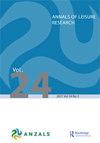从舞池到餐桌:社交距离遥远的俱乐部、暂时的城市化和伦敦夜生活的绅士化
IF 2
Q2 HOSPITALITY, LEISURE, SPORT & TOURISM
引用次数: 0
摘要
新冠肺炎物理距离措施对以欢乐为核心的文化和经济产生了特别严重的影响。在英国,疫情迫使广泛的共享社交空间前所未有地关闭,音乐场所和夜总会是受影响最长的场所之一。在首次宣布封锁措施18个月后,这些空间中的许多仍然关闭,其中很少有人或其员工有资格获得充分的国家支持(2021年夜间经济全党议会小组)。在这篇短文中,我对伦敦夜总会在此期间被迫实施的改造策略进行了一些反思,认为这些策略加速了临时城市化和城市夜生活空间的相关绅士化的长期趋势。本文章由计算机程序翻译,如有差异,请以英文原文为准。
From dancefloors to tables: socially distanced clubbing, temporary urbanism, and the gentrification of London’s nightlife
COVID-19 physical distancing measures have had especially radical impacts on cultures and economies with conviviality at their core. In the UK, the pandemic forced the unpre-cedented closure of a wide range of shared social spaces, with music venues and nightclubs amongst the most prolongedly a ff ected. Many of these spaces remained closed eighteen months after lockdown measures were fi rst announced, with few of them – or their employees – eligible for su ffi cient state support (All Party Parliamentary Group for the Night Time Economy 2021). In this short article, I o ff er some re fl ections on the reinvention strategies London nightclubs were forced to implement during this period, arguing that they constitute an acceleration of longer-term tendencies toward temporary urbanism and the interrelated gentri fi cation of the city ’ s nightlife spaces.
求助全文
通过发布文献求助,成功后即可免费获取论文全文。
去求助
来源期刊

Annals of Leisure Research
HOSPITALITY, LEISURE, SPORT & TOURISM-
CiteScore
5.30
自引率
10.50%
发文量
30
 求助内容:
求助内容: 应助结果提醒方式:
应助结果提醒方式:


